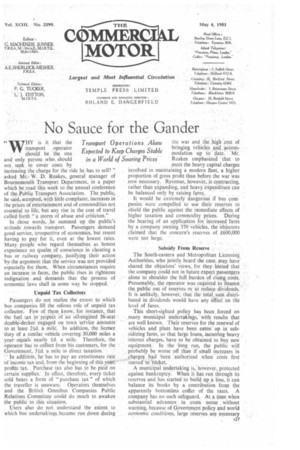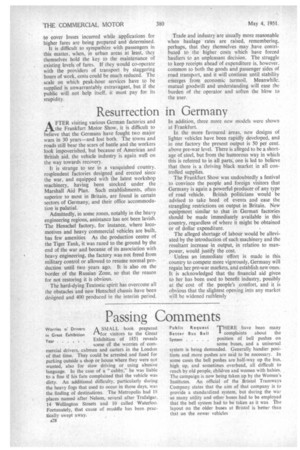No Sauce for the Gander
Page 29

Page 30

If you've noticed an error in this article please click here to report it so we can fix it.
Transport Operations Alone Expected to Keep Charges Stable. in a World of Soaring Prices is it thai the transport :operator . shonld be the one and only person ,who, should not seek to cover costs by increasing the, charge for the ride he has to sell?.', asked :mr,..:vy. a Reakes, general manager of Bournemouth Transport Department, in a paper which he. read this week to the annual conference of the, Public. Transport Association. The public, he saikaccepted;with little complaint, increases in the prices Of entertainment and of commodities not essentiaj to life, but any rise in the cost of travel called,forth `` a storm of abuse and criticism." In ,those words, he _summed up the public's attitude _towards transport. Passengers demand good service, irrespective of economics, but resent having to pay for it, even at the lowest rates. Many, people who regard themselves as honest experience no qualm of conscience in cheating a bus or railway company, justifying their action by, the Argument that the service was not provided especially for them. When circumstances require an increase in fares, the public rises in righteous indignation and demands that the process of economic laws shall in some way be stopped. 14 HY
Unpaid Tax Collectors •
Passengers do not realize the extent to which bus companies fill the odious role of unpaid tex collector. Few of them knoW, fpr instance, that the fuel tax in respect of :an oil engiiied 56 seatdouble-decker engaged on town -service amounts to at least 2.1-el. a mile: In addition, the licence 'duty of a similar vehicle covering 30,000 miles a year-equals: nearly id. a mile. Therefore, the operator has to c011ect from his customers, for the 1GOVernment, 31d. a mile in direct 'taxatiOn In ' addition ,' he has to pay an extortionate rate 'of income tax and, from the beginning of this yeat profits tax. Purchase tax also has to be Paid on certain supplies. In effect, therefore, every ticket sold bears a form of "purchase tax " of which the traveller is unaware. Operators themselves and the British Omnibus Companies Public Relations Committee could do much to awaken the public to this situation.
, :Users also do Rot understand the extent to which bus undertakings_ became _run down during the war and the ,high cost of bringing vehicles and accommodation up to date. Mr. Reakes emphasized that tO meet the heavy capital charges involved in maintaining a modern fleet, a higher proportion of gross profit than before the war was now necessary. Revenue, however, is contracting, rather than expanding, and heavy eiperiditure can be balanced only by raising feres,..
It would be extremely dangerous if bus corn7 pan ies were compelled to use their reserves to shield the public against the immediate effects of higher taxation and commodity prices. 'Duting the hearing of an application for increased fares by a company owning 370 Vehicles, the -objectors claimed that the concern's reserves of £600,000 were too large.
Subsidy From Reserve
The South-eastern and 'Metropolitan Licensing Authorities, who jointly heard the case, may, haveshared the objectors' views, for they hinted -that the company could not in future expect passengers alone to shoulder the full,burden of rising costs. Presumably, the operator was required to finance, the public out of reserves or to reduce dividends. It is unlikely, however,' that the total sent distributed in dividends would have any effeet-on the level of fares.
This short-sighted policy has been forced on many municipal Undertakings,' with results that are well known. Their reserVes for the renewal of vehicles arid plant have been eatenup in subsidizing fare, so that large loans, incurting heavy 'interest charges; have to be obtained to buy new equipment.. In the long run, the public will 'probably be worse off than if small increases in charges had been authorized when costs first started to rocket.
A municipal undertaking is, however, protected Against bankruptcy. When it has run through its reserves and has started to build up a loss, it can balance its books by a contribution from the apparently bottomless coffer of the rates. A company has no such safeguard.. At a time when substantial advances: in :costs occur without warping, because of Gayertunept policy and world economic conditions, large reserves :are necessary to cover losses incurred while applications for higher fares are being prepared and determined. It is difficult to sympathize with passengers in this matter, when, in urban areas at least, they themselves hold the key to the maintenance of existing levels of fares. If they would co-operate with the providers of transport by staggering hours of work, costs could be much reduced. The scale on which peak-hour services have to he supplied is unwarrantably extravagant, but if the public will not help itself, it must pay for its stupidity. Trade and industry are usually more reasonable when haulage rates are raised, remembering. perhaps, that they themselves may have contributed to the higher costs which have forced hauliers to an unpleasant decision. The struggle to keep receipts ahead of expenditure is, however. common to both the goods and passenger sides of road transport, and it will continue until stability emerges from economic turmoil. Meanwhile. mutual goodwill and understanding will ease the burden of the operator and soften the blow to the user.




































































































